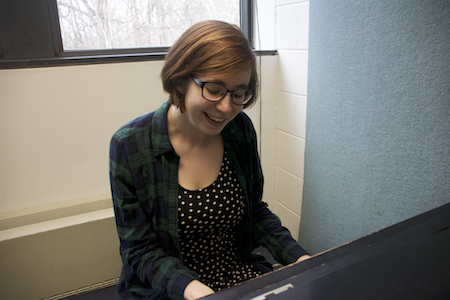Music major and biology minor Rachel Hottle ’18 considers herself to have taken “a liberal arts approach to music,” exploring many musical skills and concepts instead of sticking to just one. She plays both the flute and piano, and sings in the Swarthmore College Chorus, Garnet Singers, and Grapevine acapella group. She also composes music herself, including a piece based on Emily Dickinson’s poem, “We Grow Accustomed to the Dark,” that was performed in the Swarthmore College Chorus concert last fall.
Hottle has found inspiration in female composers and songwriters. “I was trained in classical flute and piano but most of the composers of classical music tend to be dead white men, which was not the most inspiring thing for me growing up,” she said. “It’s hard to look up to Mozart as a young girl. So I play primarily classical music but I draw my inspiration from Joni Mitchell, Carole King, [etc]. I really look up to female singer-songwriters.”
Her interest in the gender imbalance present in classical music has stayed with her throughout her time at Swarthmore, influencing her senior recital. “My initial idea was, ‘I wanna do a recital that has only music by female composers,’ but I have since discovered that that’s kind of difficult since there aren’t a lot of female composers,” Hottle said. She instead adjusted her plans to feature “mainly non- dead white men” in her recital.
Hottle’s senior recital will be “a little more eclectic than most senior recitals,” according to her, including singing, flute, guitar, duets with friends, and a song from Grapevine. “Playing with other people has been an important way that I’ve connected with people outside of your typical social interactions,” she said. “One of my closest friends who graduated, we would just hang out all the time and sing and play the guitar and just harmonize together.”
She has cultivated this love of group music-making since she was 12, when her church asked her to play piano to fill a gap in their ensemble.
“I think that was pretty central to my musical formation, being forced to do things that were a little bit beyond my ability,” she said. “I had to improvise on the fly and learn how to be really flexible, which I think really helped me in group music-making.”
After leaving the tight-knit Swarthmore community where she participated in so many ensembles, Hottle plans to study music cognition in a graduate program. She will also continue playing music as well as studying it.
“Regardless of what I’m doing, I definitely want to keep playing after I leave Swat and I’m not sure how that works in the real world…are there community groups that you can join? Do you just hang up flyers saying ‘who wants to jam with me?’ I don’t know.”
Bayliss Wagner ’21
